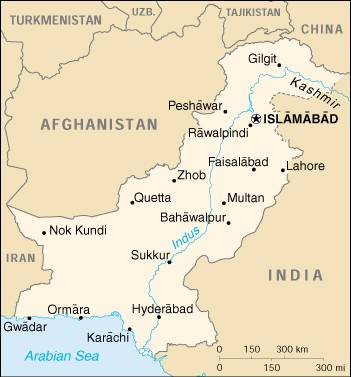Geopolitics of the
By M K Bhadrakumar
The hearings of the
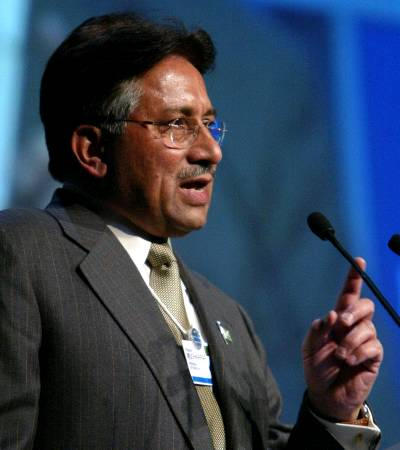
President of Pakistan Pervez Musharraf
Moreover, there may be no need for the Bush administration to pressure President General Pervez Musharraf. The Pakistani leader seems to be positioning to play a profoundly meaningful role in
The Bush administration’s predicament was fully revealed in the contradictory references contained in the written statement handed in by the then director of national intelligence, John Negroponte, during his testimony before the US Senate subcommittee on intelligence on January 11. On the one hand, Negroponte claimed that al-Qaeda’s core elements are still “resilient” and are plotting against US national-security interests from their leaders’ “secure hideout” in Pakistan and, furthermore, that the Taliban and al-Qaeda maintained “critical sanctuaries” in Pakistan.
On the other hand, Negroponte described
Again, Negroponte estimated that the challenges facing President Hamid Karzai’s government in
Negroponte treated with kid gloves the entire delicate issue of Taliban and al-Qaeda activities in
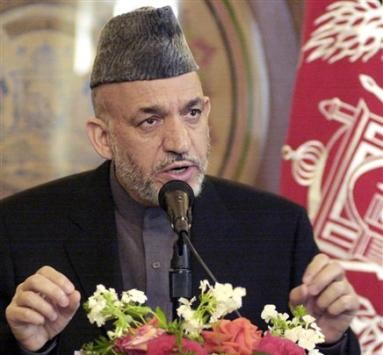
President of Afghanistan Hamid Karzai
But the astonishing part of Negroponte’s statement was his observations regarding the nexus between the “war on terror” and Musharraf’s own political future. Negroponte implicitly acknowledged that Musharraf is politically vulnerable and his ability to crack down on the Taliban will, therefore, be significantly reduced in the months ahead because of the compulsions of the elections in
But elsewhere in his testimony, Negroponte contradicted himself by virtually expressing confidence that Musharraf’s continuance in power is beyond doubt, despite the huge criticism within
What explains such verbal jugglery? Indeed, statements at other senior levels in the Bush administration in recent days have also paid handsome compliments to Musharraf’s cooperative attitude in countering the Taliban challenge, including at the level of the military leadership.
The commander of North Atlantic Treaty Organization (NATO) forces in
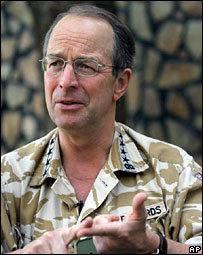
Commander of NATO forces in Afghanistan,
General David Richards
In an interview with an Afghan news agency last week, Richards said the Pakistani army was fully cooperating and was doing its best to stop cross-border activities by the Taliban. He said categorically, “It is no longer the policy of the
“The conditions are ripe for a complete victory,” Richards claimed. So what has happened to the crisis that Karzai has been complaining about in respect of
Someone also seems to have advised Karzai to see the writing on the wall. He too has calmed down. In his presidential address to the Afghan Parliament in
Evidently, Karzai has been advised by the
And indeed, the White House is to ask Congress next month for US$8 billion in new funds for
A sense of alarm over the Taliban’s resurgence is apparent in regional capitals, especially
However, Russian Deputy Foreign Minister Alexander Losyukov said in
Meanwhile, the Russian and Indian foreign ministers reviewed the regional situation, including
Central Asian countries feel equally nervous about the deteriorating situation in
But will the cozy US-Pakistan condominium that has been at the steering wheel in the “war on terror” in
The geopolitics of the Afghan war are seldom talked about, but they have figured throughout at the center of the closely guarded US-Pakistan agenda. For the same reason, very little is heard nowadays about the idea mooted by French President Jacques Chirac at NATO’s Riga summit in late November regarding the formation if a “contact group” on Afghanistan comprising countries in the region that have an interest in Afghanistan’s stability. The proposed group would have made the conduct of the war more transparent and regional powers would have found such a forum useful.
But
But there are other nuances, too. It appears that the
In a rare gesture, King Abdullah of
The emphasis during Musharraf’s discussions in the pro-American Sunni Arab capitals has been on joint “Islamic action” in tackling the crisis in the
Kissinger wrote that Bush’s
Equally,
Musharraf is sending Prime Minister Shaukat Aziz to NATO headquarters in
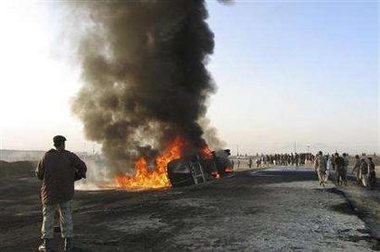
Burning oil tanker carrying fuel for NATO forces after suspected
Taliban fighters attacked it at thePakistan-Afghan border post
of Chaman, January 14, 2007.
Formal NATO-Pakistan cooperation is bound to impact on the “war on terror” in
Conceivably, a significant step was taken by the Afghan Parliament when it approved on Wednesday the formation of a National Reconciliation Commission. Speaking in Parliament, the enigmatic veteran Wahhabi leader Abdul Rasul Sayyaf strongly urged dialogue with the Taliban. Sayyaf couldn’t have spoken in a vacuum. In a checkered political life spanning four decades, he has kept links with
At the same time, emerging ties with
The rapid sequencing of these developments is interesting, to say the least. It is hardly a week since the new chairman of the US Senate Intelligence Committee, Jay Rockefeller, told the New York Times that the Bush administration’s statements about
M K Bhadrakumar served as a career diplomat in the Indian Foreign Service for more than 29 years, with postings including ambassador to
This article appeared in



